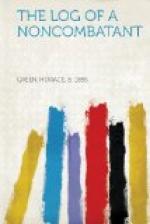“We entered a low-ceilinged room, or pen, sparsely lighted by wax candles. The first object which caught my attention was a youthful Russian soldier, almost a child, lying on a straw mattress, smiling as if asleep. I approached; I put my hand on his forehead ... ice-cold— dead. Some of the men approached to take off the clothing; others stood around in a half-circle, silently looking on. Suddenly there was a murmur... They seemed awe-stricken, these brave fellows, who are not daunted even by overwhelming odds. They hesitated, and one of them, advancing a few paces to me, reports: ‘This Russian soldier is a girl.’
“This happened in the year 1914.
“We found out that the girl was the betrothed of a Russian officer, and fought side by side with him throughout the campaign, until killed by a shot in the breast. The officer was taken prisoner. I buried her myself that same day...”
In order to make clear what happened when I crossed the German border for the last time, I should explain that I now had with me several trophies which I had obtained with great difficulty and was correspondingly anxious to bring home. Among them was a German private’s helmet and an original Iron Cross of the second degree. The marking on the temple band of the helmet said, “48th Regiment, 4th Army Corps, Company 7, No. 57, 1909-1914,”—meaning that the owner started service in 1909 and the helmet was issued to him in 1914. It is believed it belonged to a soldier who was either wounded or killed outside of Antwerp. The Iron Cross has on it: “1870” (when the order was started), and the letter “F” (Friedrich), and the date of its issuance. I should add that I did not rob a dead or dying soldier of these trophies, but I was asked not to show them in either Belgium or England, nor to state how I came by them. And I have kept my promise.
I had also a fragment of shrapnel casing from a 32 cm. shell—the only bomb which hit the Antwerp Cathedral during the German attack. It was given to me by Mr. Edward Eyre Hunt, who picked it up on the morning of the German entry. There were also some Belgian bullet clips and a bit of shrapnel picked up near the spot where I was knocked down by the concussion of a bursting shell on that same morning.
When I reached Bentheim we were put through the usual search by the border patrol and military officials of the Zollamt. I had pinned the Iron Cross to my undershirt, but the helmet was a bit bulky for such treatment.
“Take it out!” roared the officer who discovered the headgear wrapped in a sweater in my rucksack. “Dass ist str-r-reng ver-r-rboten!”
When I explained that I had come by it honestly, and wanted to take it home, he burst into a passion. The fact that I showed a letter from Von Bernstorff and explained that I was known in the Foreign Office in Berlin made no impression whatsoever. The officer said that if the owner was dead, the helmet could not even go to his family. It was government property and should return, therefore, to the commissary department. At all events, it must not leave the Empire.




